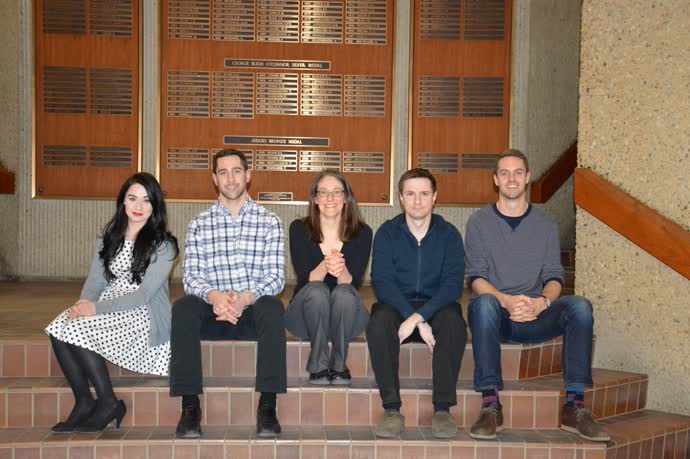
Vanessa Fiorillo, Coleman Brinker, Emma Banfield, James Konopka, and Dylan Gibbs.
With the applications reviewed and the interviews complete, congratulations are in order for a number of UAlberta Law students who have secured clerkships with the Alberta courts for the 2018/19 year.
Congratulations to Emma Banfield, Dylan Gibbs, and Rachel Weary, who will clerk at the Court of Appeal of Alberta, and Coleman Brinker, Vanessa Fiorillo, Tanis Avery, and Rayleen Nicolajsen, who will clerk at the Court of Queen's Bench of Alberta. All students will remain in Edmonton, with the exception of Gibbs and Avery, who will reside in Calgary.
Clerkships at both courts are 10 months in length, followed by a mandatory five-month term with an Alberta lawyer (Court of Appeal) or law firm (Court of Queen's Bench). They are an alternative to the traditional and composite 12-month articling term that all law students undertake before they apply to gain admission to the Law Society of Alberta. During a clerkship, the student-at-law is assigned to a justice or judge who acts as the student's principal throughout their term.
According to the Court of Appeal, as clerks, Banfield, Gibbs, and Weary can expect to "hone their legal research, analysis, and writing skills and learn valuable lessons in the art of advocacy by observing counsel in court." Additionally, they will "review motion and appeal materials, research a broad range of legal issues, and prepare pre- and post-hearing memoranda of fact and law. They may also be asked to review, edit and comment on draft reasons for judgments and/or assist justices with speeches and academic papers and presentations."
Each student-at-law clerking for the Court of Queen's Bench will "often review briefs prior to hearings and attend applications and jury and non-jury trials." In addition, students "are given the opportunity to research, write and discuss cases with the presiding Justices as they unfold. Students at the Court are encouraged to attend as many hearings, in as many Courts, as time permits."